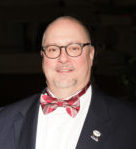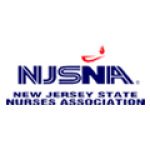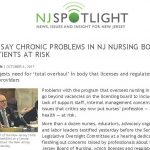NJSNA President Testifies: ‘Government Inaction Puts Lives At Risk’
Benjamin Evans Offers 6 Recommendations To Improve Healthcare System
 TRENTON, N.J.—Oct. 5, 2017— The New Jersey State Nurses Association president testified today at a N.J. Senate Oversight Committee hearing that lack of government involvement is putting the lives of New Jersey patients at risk by creating a “public health crisis.”
TRENTON, N.J.—Oct. 5, 2017— The New Jersey State Nurses Association president testified today at a N.J. Senate Oversight Committee hearing that lack of government involvement is putting the lives of New Jersey patients at risk by creating a “public health crisis.”
NJSNA President Benjamin Evans, DD, DNP, RN, APN blamed multiple government administrations for inaction that has created an ineffective New Jersey Board of Nursing (NJBON) that hurts the nursing profession and the overall healthcare system. He referenced delays in licensures, lack of oversight for nursing education programs and lack of support staff and appointees.
“The leadership of NJSNA and the Board of Directors are very disappointed that our elected officials are not taking the ongoing issues at the Board of Nursing more seriously,” Evans said. “We come to you as a nonpartisan professional association that is looking out for the best interests of the practice of nursing and the patients of New Jersey—and we are all patients. While we are grateful for Gov. Chris Christie filling board seats and eliminating all board vacancies, the announcement of the appointments last Friday afternoon seemed a bit uncanny given this Senate Oversight Committee hearing about the Board of Nursing was scheduled.”
Late last week, Gov. Christie announced the appointment of 10 new members and three reappointments to the Board of Nursing, which review nursing applications, education programs and disciplinary actions. Some of the vacant seats had been unfilled for years and, as members retired or aged off, no replacement appointments had been made. “It is curious that we had not seen any action from this governor or previous governors to appoint any new Board of Nursing members until less than a week before this hearing,” Evans said. “This is just the first step in dealing with many problems that are hindering the practice of nursing and impacting patients.”
Recommendations from NJSNA
On behalf of New Jersey nurses, Evans made the following recommendations to address on-going issues:
- State legislators and the Governor’s office must aggressively work to fill the positions of Executive Director and Deputy Executive Director within the next 12-16 weeks.
- The current position posting contains the requirement of a Bachelor’s Degree not specific to nursing. This is a downgrade from previous position postings and must be changed to reflect the complexity of oversight of educational programs and complex issues presented before the board. This must be changed to ensure that the executive director has a higher degree. An entry level degree, and one that is not required for the discipline of nursing, is unacceptable.
- While not all work of the board needs to be carried out by Registered Nurses, the executive director, deputy executive director and those who oversee licensing, disciplinary and education should all be Registered Nurses, preferably with a Doctoral degree and related experience.
- There must be sufficient staff within the Board of Nursing to process applications for licensure or licensure by endorsement in a timely manner. These should be regular employees of the board and not temporary workers sent to provide a stop-gap measure.
- The effectiveness of the outsourced call center should be measured for cost, quality and accuracy. If these indicators cannot be shown, then perhaps it would be more cost-effective to bring the work back internally with a few dedicated staff members.
- The State Legislature and the Governor’s office must audit usage of the more than $14.5 million in revenues collected annually from Board of Nursing through licenses, permits, penalties and other services. Five percent of monies collected goes to the New Jersey Collaborating Center for Nursing and $5 of each license fee, about $600,000, goes to support the Recovery and Monitoring Program. Where does the rest of the money go? The budget breakdown NJSNA Open Public Records Act (OPRA) requested does not clearly define how the money is appropriated.
Staffing & Funding the Board of Nursing
Staffing at the Board of Nursing is also an issue. NJSNA is not aware of any movement on filling the executive director position vacated by Dorothy Carolina in July after just 13 months in the role and there also has been no authorization for overtime to deal with the backlog of paperwork. “The one registered nurse left on staff at the Board, whose job it is to oversee disciplinary cases, is taking on the role of acting executive director and she is educationally unqualified for the position, as it requires an advanced degree because of the complexity of issues,” Evans said. “The position of deputy executive director is also vacant, which puts this new board—with 10 new appointees and a new president—in a perilous position without a qualified nurse leader to guide it.”
Funding the Board of Nursing should not be an issue. The State of New Jersey collected more than $14.5 million in revenue in 2017, according to records NJSNA requested through the OPRA. “We are unsure, based on the documents provided to us, how the money is spent,” said Judith Schmidt, NJSNA CEO. “The nurses of New Jersey certainly generate enough money to adequately support a fully-staffed Board of Nursing with appropriate educational backgrounds and experience. Records available through OPRA do not clearly explain the finances of the Board of Nursing. They only leads to more questions.”
Board of Nursing responsibilities
The Board of Nursing oversees the state’s 143,500 registered nurses, advanced practice nurses and licensed practical nurses, in addition to the 80,000 certified home health aides. NJBON staff review all licensure applications, which are both paper and electronic. A new nurse must fill out an application and have it approved by the board before they can sit for the National Council Licensure Examination (NCLEX) licensure exam. This process has been taking more than 60 days for the most recent graduating classes. “This is leading to employment offers being revoked and lower NCLEX scores and/or failures because the Board is not reviewing applications in a timely fashion,” Evans said.
After the NCLEX scores arrive at the Board of Nursing, the licenses are issued in a timely fashion because it is an all-electronic process.
To further aggravate the primary care crisis, the licensure process for advanced practice nurses (APN)’s drags along at the Board of Nursing. APN’s hold a secondary license after an advanced degree and national certifications are complete.
Due to the non-responsiveness of the New Jersey Board of Nursing, other state’s Boards of Nursing are requiring that applicants get their own paperwork from New Jersey.
For nurses looking to come into New Jersey and practice or leave New Jersey and practice elsewhere, there are delays in the endorsement process. “One case sticks out in particular because a nurse came to NJSNA desperate for assistance because she had been waiting since March for her paperwork to process to practice in another state and had not received a response by July,” said Evans. “She turned to us for help out of frustration. Delays caused by the short staffing at the Board of Nursing will magnify existing shortages in nursing, especially APNs who are taking on larger roles in the healthcare system.”
Community-based care from APNs
Healthcare is moving back into a community-based model of care where APNs are increasingly being utilized for their skills to be primary caregivers for large segments of the population. “Medical schools are not producing enough primary care doctors, which is leaving a gap in our healthcare system,” said Evans, an APN who specializes in mental health. “APN’s are filling these gaps and providing care, especially in rural and urban communities. What will our healthcare system look like in a few years when there are not enough registered nurses?”
Other issues
Lack of an education person on the Board of Nursing means nursing programs do not have quality supervision. There is no staff at the Board of Nursing qualified to visit programs to ensure that the standards of nursing education are being met, especially in the licensed practical nurse programs. Currently, a consultant—a doctoral prepared RN—is reviewing nursing programs and program applications, but not conducting on-site visits to educational institutions. Another problem is that a few schools are not doing thorough screenings of nursing students so graduates are running into problems when applying for their licenses.
The outsourced Board of Nursing call center frequently gives callers incorrect information about applications, continuing education requirements and other professional related issues. As it is outsourced, they send a messages to the Board of Nursing for information that never seems to get returned.
###
About NJSNA
NJSNA, which was established in 1901, is a constituent member of the American Nurses Association. The New Jersey State Nurses Association (NJSNA) represents the interests of 125,000 registered nurses and advanced practice nurses as an advocate for the nursing profession. NJSNA’s lobbying arm continues to protect the nursing profession through legislative victories. Its nonprofit foundation, Institute for Nursing, helps nurses further their careers by providing continuing education, scholarships and research grants in addition to invaluable networking opportunities. For more information, nurses can visit www.njsna.org or contact NJSNA at njsna@njsna.org or (609) 883-5335.




